
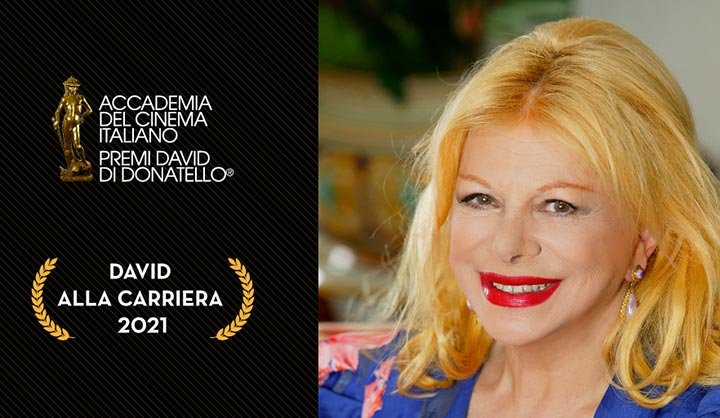



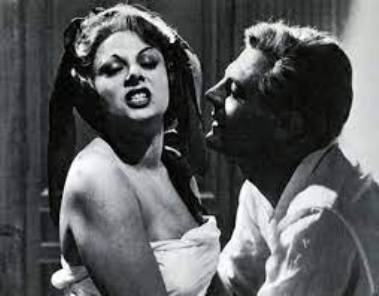
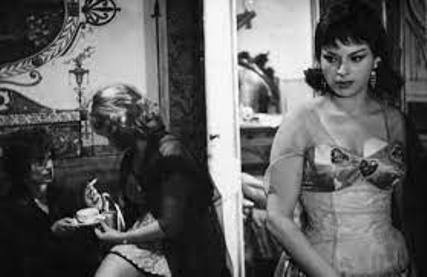
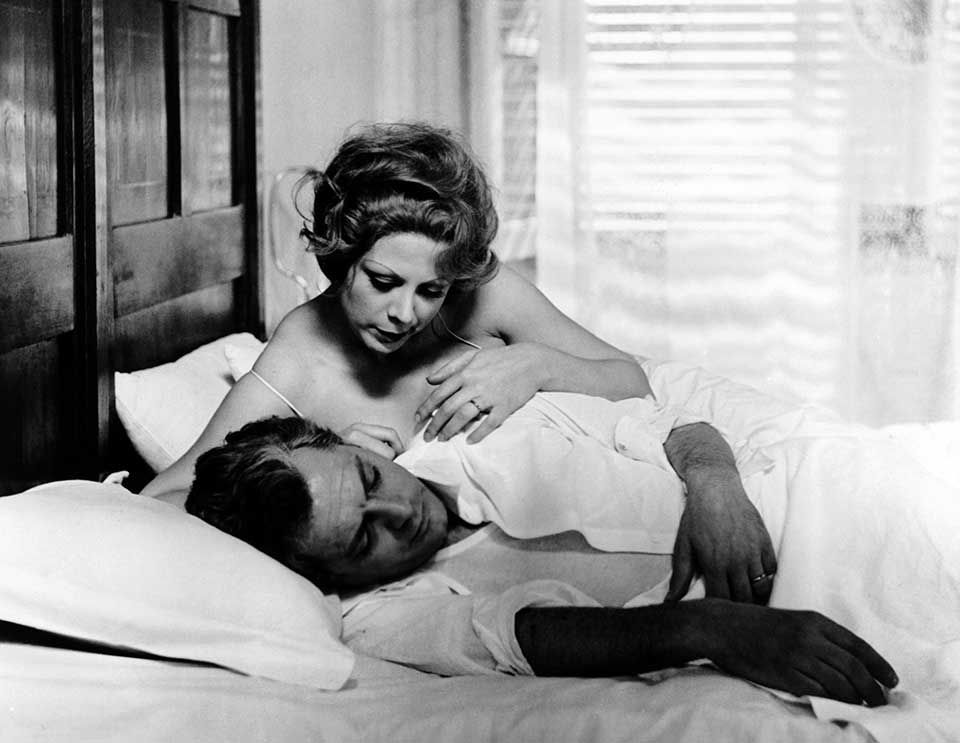
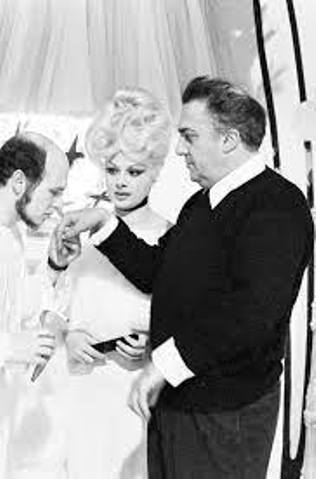
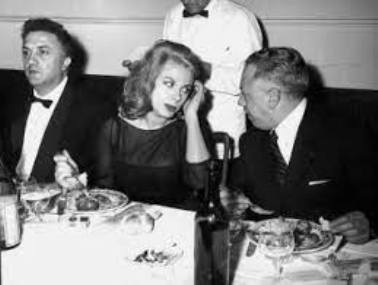
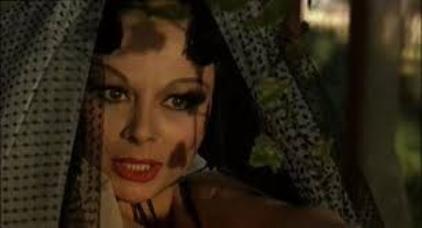
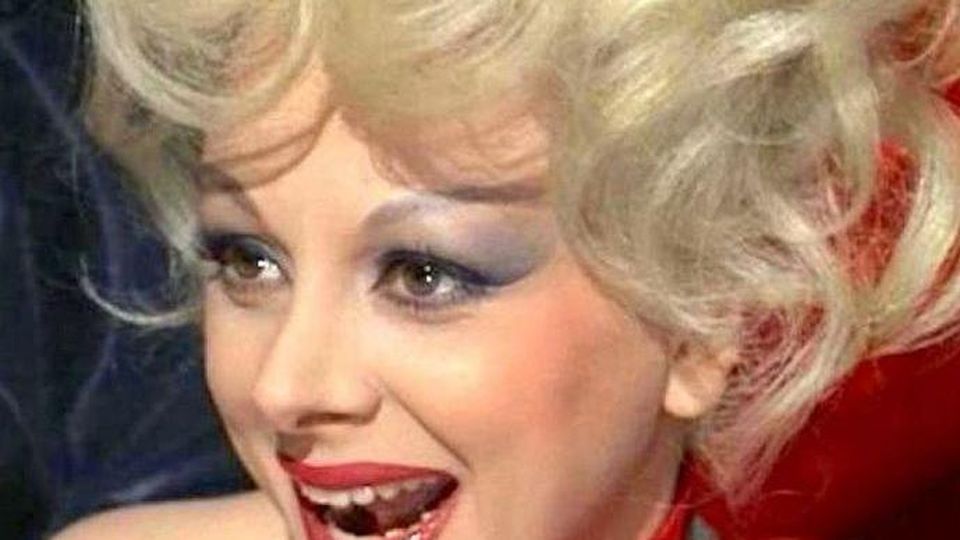
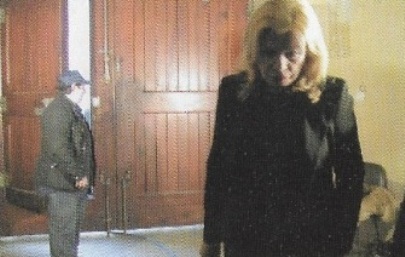
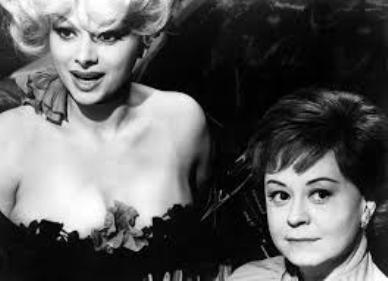
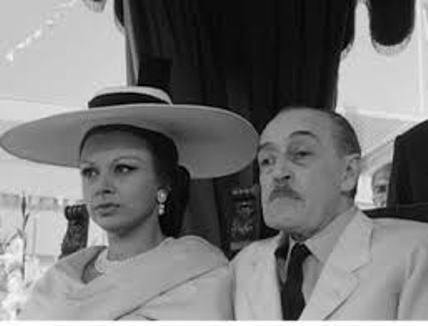
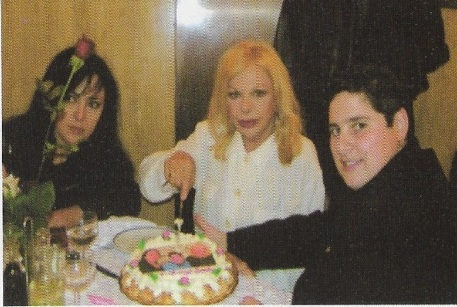
%20of%20b.inglese.png) MAY
29,
2021
MAY
29,
2021
by Maria A. Avveduto
The "David of Donatello" prizes awarded by the Academy of Italian Cinema
were awarded on May 11th. The award ceremony was broadcast live on Raiuno
and was conducted by Carlo Conti. The "David di Donatello" awards are
chaired by Piera Detassis.
The David di Donatello "Lifetime Achievement Award" was received by Sandra
Milo.
The actress of Sicilian origins but born in Tunis has starred in about 60
films starting with "Il Generale Della Rovere" by Roberto Rossellini, "Adua
and her companions", "Ghosts in Rome", "Juliet of the spirits" and " 8½ "awarded
with the Oscar and directed by the great and inimitable Federico Fellini.
Among the films she has starred in is the film "In the heart of a diva"
produced by South Pictures and directed by the young master director
Annarita Campo.
"In the heart of a diva" was made under the patronage of the Municipality of
Syracuse, where it was filmed, and the "Ministry of Equal Opportunities"
with the collaboration of the "State Police".
It was the first movie to have real cops in the movie.
In this regard, we propose again an interview by Sandra Milo released
exclusively to our newspaper "Divi & Cinema" at the debut in 2006.
Sandra Milo, great Diva of Italian Cinema, 41 years of entertainment behind
her, among the few known and admired on the international scene, much loved
by the public for her great humanity and her immense sweetness. She is the
mother of three children: Debora, from the marriage with the producer Moris
Ergas and then Ciro and Azzurra from the marriage with Ottavio De Lollis.
She has a great love for animals especially cats and dogs. Her first dog was
called "Fortunella", and in choosing her name she was inspired by the
character of the "Corriere dei Piccoli":
She has had a lot of animals in her life, once she got up to twenty-five
kittens in the house.
She and she is one of those people with a big heart, who condemns those who
abandon or mistreat animals.
But let's move on to her artistic career, which began in the 60s, when she
was twenty, she arrived in Cinecittà, among her characteristics: a beauty
like the sun and a joy that involves you.
On the orders of Fellini and Pietrangeli her black hair became "platinum",
and she was given a stage name: "Milo", in homage to her shape while the
name "Sandra" was given to her to make her look familiar. .
His film career began by participating in several films, in which he covered
small parts, such as in "Lo Scapolo" with Alberto Sordi in 1955 and with
Totò in the film "Totò nella luna" in 1958, but his first important role was
in “Il Generale della Rovere” from 1959 directed by Roberto Rossellini.
In 1961 she starred in Luchino Visconti's films "Vanina Vanini" and in the
same year she was asked to participate in Pietro Germi's "Divorzio
all'Italiana", in which she had to play the role of the wife of Baron Fefè
(Mastroianni), but refused and the role was played by Daniela Rocca.
In 1963 Federico Fellini wanted all ingenuity and still black in "8 ½", an
autobiographical film that tells the life of a director, played by Marcello
Mastroianni, divided between his wife (Anouk Aimèe) and the sensual lover
Carla played by Sandra Milo . Winning film of 2 Oscars: "Best Costumes" to
Piero Gherardi and "Best Foreign Film".
The title of the film refers to the number of directories signed by Fellini,
half refers to his debut film where he signed half of "Variety Lights", the
other part was directed by Alberto Lattuada.
In 1965 she was erotically obsessive in "Giulietta degli spiriti" with
Giulietta Masina, where she plays three characters: Susy, Iris and Fanny.
It was the first color film directed by Fellini and the one that closed his
collaboration with the screenwriter Ennio Flaiano.
For both films, in 1964 and 1966, she took home the "Nastro d’ Argento "as"
Best Supporting Actress ".
Retracing the artistic career of Sandra Milo, we would go to remember the
whole history of Italian Cinema, she was one of the main exponents of the
history of our cinema, protagonist of films that have made history and many
names that have accompanied her: from Sordi in Totò, from Masina to Bardot,
from Vittorio De Sica to Ugo Tognazzi, a list of names that does not end
here, we could continue with Jean-Paul Belmondo, Silvia Koscina, Eduardo De
Filippo, Vittorio Gassman, Marcello Mastroianni, Catherina Denueve, Anouk
Aimèe, Anita Ekberg, Ciccio Ingrassia, and then Fernandel (the legendary Don
Camillo), etc.
The list could go on, but we would always come to the same point, and that
is that Milo is a great actress with a big heart, so much so that in the
late 60s she slowed down her career to devote herself to her family and
especially to his two children: Ciro and Azzurra.
In the cinema she will return in 2003 to interpret Pupi Avati's “Il cuore
Altrove” and later in the film “Nel cuore di una diva” directed by the very
young Annarita Campo, soon to be released.
For the television debut we have to go back in time and precisely to 1966
when she holds the role of animator of “Studio Uno”. In 1983 he participated
in "Mixer" by Gianni Minori, in 1984 he presented the program "Piccoli Fans"
on Raidue, but the program that remained most expressed in the memory of
viewers was "Love is a wonderful thing" of 1989 , when during a live
television Milo was reached by an anonymous phone call, it was January 8,
1990, when she was informed that her son Ciro had been involved in an
accident. A phone call in bad taste that naturally communicated a false
news, but the public from home remained attached to the television to
understand what had happened, shaken by the great pain felt by a mother
towards her son.
This program is followed by many television appearances. In 2002, she plays
a sixty-year-old ex soubrette in the fiction of Canale 5, "But isn't there
ever a goalkeeper?" with Giampiero Ingrassia.
In 2005 she was among the protagonists of the reality show "Back to the
present" presented by Carlo Conti and broadcast on Raiuno, where she reached
the final occupying the second place of preferences, also in 2005 she
participated in the network reality 4 "The Great Circus ”Conducted by
Emanuela Folliero, where she showed off her circus skills.
Lately she has given herself to the theater, interpreting several comedies,
which have taken her on tour throughout Italy, including the recent "Di
profile sembro pazzo" alongside Gianfranco D'Angelo, directed by Claudio
Insegno, who has collected a great success with the public.
She is now back on a theatrical tour with a new show always alongside
D'Angelo.
After summarizing in a few words the 41-year career of the one who will
remain one of the great Divas of Italian Cinema, we reveal and understand
the secrets of this long-awaited film, through an exclusive interview with
it.
The list could go on, but we would always come to the same point, and that
is that Milo is a great actress with a big heart, so much so that in the
late 60s she slowed down her career to devote herself to her family and
especially to his two children: Ciro and Azzurra.
In the cinema she will return in 2003 to interpret Pupi Avati's “Il cuore
Altrove” and later in the film “Nel cuore di una diva” directed by the very
young Annarita Campo, soon to be released.
For the television debut we have to go back in time and precisely to 1966
when she holds the role of animator of “Studio Uno”. In 1983 he participated
in "Mixer" by Gianni Minori, in 1984 he presented the program "Piccoli Fans"
on Raidue, but the program that remained most expressed in the memory of
viewers was "Love is a wonderful thing" of 1989 , when during a live
television Milo was reached by an anonymous phone call, it was January 8,
1990, when she was informed that her son Ciro had been involved in an
accident. A phone call in bad taste that naturally communicated a false
news, but the public from home remained attached to the television to
understand what had happened, shaken by the great pain felt by a mother
towards her son.
This program is followed by many television appearances. In 2002, she plays
a sixty-year-old ex soubrette in the fiction of Canale 5, "But isn't there
ever a goalkeeper?" with Giampiero Ingrassia.
In 2005 she was among the protagonists of the reality show "Back to the
present" presented by Carlo Conti and broadcast on Raiuno, where she reached
the final occupying the second place of preferences, also in 2005 she
participated in the network reality 4 "The Great Circus ”Conducted by
Emanuela Folliero, where she showed off her circus skills.
Lately she has given herself to the theater, interpreting several comedies,
which have taken her on tour throughout Italy, including the recent "Di
profile sembro pazzo" alongside Gianfranco D'Angelo, directed by Claudio
Insegno, who has collected a great success with the public.
She is now back on a theatrical tour with a new show always alongside
D'Angelo.
After summarizing in a few words the 41-year career of the one who will
remain one of the great Divas of Italian Cinema, we reveal and understand
the secrets of this long-awaited film, through an exclusive interview with
it.
EXCLUSIVE INTERVIEW
D:
In the film you play a Sicilian woman who is fighting for the value she
believes in most: that is family! What was it like playing this character
and what are the emotions you felt as a character and not as an actress?
A: << Well, in the meantime the character looks a lot like me, I too am
a Sicilian woman, on my father's side, then of course I am a woman who
deeply believes in family values ??and therefore I resemble the character of
the film, just as it is! >>
D: Of all the scenes you have shot, which is the one that struck you the
most?
A: << The one when I kick my son out of the house, because I identified
myself and I was thinking of me chasing Ciro, my son, and therefore I had a
very painful scene, difficult to do, but of course I did it like the script
he said. >>
Q: What were the things about the script that moved you?
A: << First of all, shooting with a very young girl, Annarita, who is a
girl who writes, directs, has made music, she is truly a talented girl with
great willpower, with a great ability to realize who they are. your dreams.
And this is quite difficult because we all dream but then in the end we find
it difficult to make dreams real, instead she succeeded, she succeeded well
and therefore I feel admiration for Annarita and I am happy to have
participated in the film of this young woman and beautiful girl. >>
Q: This film has attracted the attention of the public who eagerly awaits
him at the cinema, in Sicily in particular it has already become an event.
In your opinion, what are the factors that made this film a highly
anticipated event even before its release?
A: << The proper fact of history. The story tells of a woman who has
desires, ambitions and aspirations and then obviously with a lot of effort
and with a lot of determination she manages to achieve, so it is the story
of a victory of a human being who wins in the adversities of life and then
he manages to translate his dreams into reality. I think this is very
beautiful, then it reflects the true character of the Sicilian woman who is
very strong, determined and has a lot of importance also in the family for
her strength. >>
Q: What are the reasons why the public should see this film?
A: << See how you have to fight and how not to be demoralized in the
face of the defeats that are inevitable in life, but you have to believe in
yourself, believe deeply in your desires, in your aspirations and fight to
be fulfilled. >>
D: Some have defined “In the heart of a diva” a film that is very
inspired by the cinema of Neorealism, because it manages to tell reality as
it is and with a touch of magic! What are your thoughts on this statement?
A: << The film has the form of innocence, in the sense that it tells a
story with simplicity trying to stay close to reality - In this I must say
that Annarita has succeeded very well. >>
Q: How did you meet Annarita Campo?
A: << Annarita Campo, phoned me one day, told me that she was a Sicilian
girl who wanted to make a film ... and I was immediately struck by her
determination, her willpower, her ability not to give up. go ahead, I met
her, she was with her mother, two amazing women. I look at her, with a kind
of surprise and admiration. >>
Q: How was your relationship with her on set?
A: << Excellent, excellent! Because she is very cheerful, she is one who,
it is not because she makes the film that she forgets to laugh, no! Remember
that you have to eat, that you have to eat well, that eating is a party and
therefore well, very well, I am like that too, I don't want to lose sight of
what are the little pleasures of everyday life.
Q: ”What are the feelings you want to convey with this film?
A: << Precisely this, the strength of love, the strength to believe in
human abilities. This is very important, then many people let themselves be
taken by depression and no longer believe in themselves, they no longer
believe in others. Instead, believing is very important, because if man
wants to marry the mountains too. >>
Q: Why did you choose to work with her?
A: I have already said, because I liked her abilities, her inner
strength, her ability to fight to the end for her own battles. I really
enjoyed all this! >>
Q: If you were to indicate with a number the skill of the camp, from 1 to
100, which number would you choose?
A: << I don't like numbers, because numbers are far from art. La Campo
is a talented girl that I am sure that if she continues she will make a
great cinema, a beautiful cinema and this is what I wish her with all my
heart. >>
Q: The Sicilian press and some directors have declared that Campo manages
to make films like no one can do anymore and also for this reason her style
has been compared to some directors. In your opinion, which directors of
Neorealism do you resemble the most and why?
A: << To Rossellini's neorealism, which is made up of great truth, great
passion and as a temperament it is closer to the Campo. >>
Q: Your best moment, what was it? The moment when she felt truly happy?
A: << When my children were born, and therefore three times! >>
Q: The first thing you look at in a person?
A: << The first thing you look at is inner honesty, that is, loyalty, the
ability to be yourself and it takes a lot of courage to be yourself, because
we all try to look better than we are, but to look like we are it really
takes courage. Here I like people who have the courage to be themselves >>.
Q: How is the relationship with dreams? Do you have any dreams to fulfill
or have you already realized everything?
R: << No, for heaven's sake !! There are still many dreams to fulfill.
Dreams are important in human life, because without dreams it is like
starting to die. Ninth! You have to have many dreams and dream of making
them come true and try to make them come true !!! >>


